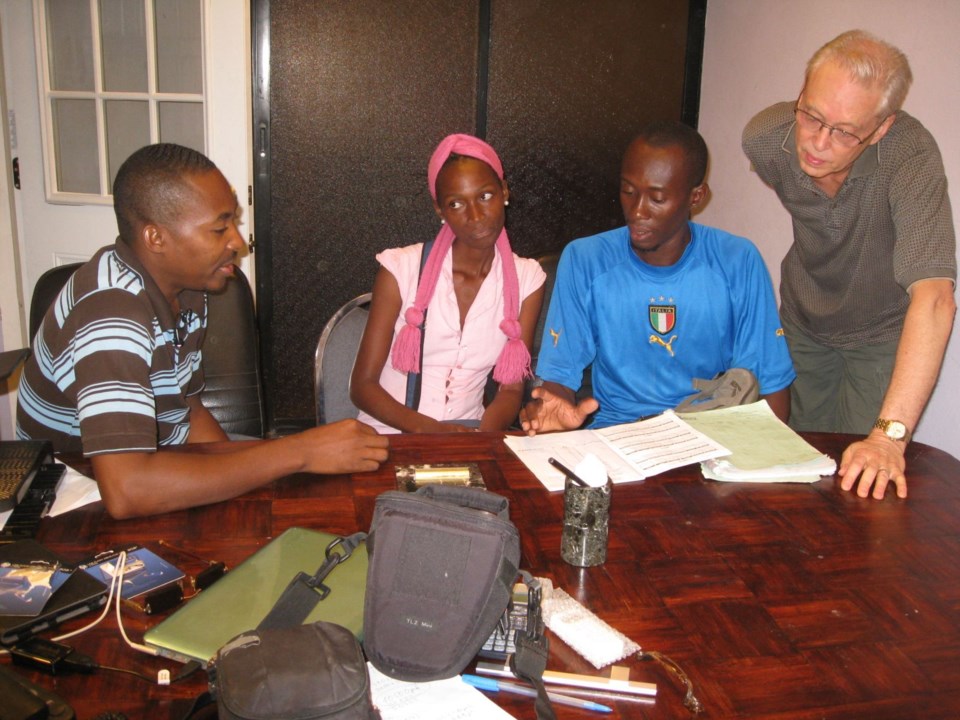In a climate as hot as Haiti's, it doesn't take long for people to get thirsty.
Tropical fruit grows on trees there year-round, so juice supplies are abundant.
All the tools for a thriving small business exist in the Caribbean Island. All that was needed was a bit of a push.
David Low was more than happy to supply that shove.
The Prince George debt counsellor made his fourth trip to the poverty-stricken country a few weeks ago and came home with news of another business entrepreneurship success story. He provided $300 to a young couple to start a street market juice business to overcome their debt, which had gotten to the point where they could not afford their rent, were facing an eviction notice, and had to pull their kid out of school.
"Now they're making money from their juice business -- it's only about $150 a month, which is $150 more than they had -- but with that they can pay their $35 rent and can pay $30 for their kid to go to school and they have some money left for food," said Low. "On the side of their juice business they buy mangos and make a 50 per cent markup on the mangos they sell."
Low and his wife Dorothy, a registered nurse, operate the charity Life International Foundation Inc., funneling donations to help the poorest country in the Western Hemisphere rebound from the 2010 earthquake, which killed 223,000 people and caused widespread property damage.
Low, 64, owner of AAA Credit Counsellors and Debt Consultants in Prince George, visited Haiti for the first time year ago. Focusing on Carrefour, a city of about 500,000 where nearly half the buildings were destroyed in the earthquake, Low saw the need for his services when he learned many Haitians lack the ability to put a business plan together. He met many people who had no idea how to keep financial records and had no concept of the value of spending only their net profits while saving enough revenues to keep their businesses operating. The project has become Low's longterm humanitarian mission.
During his most recent trip, Low gathered the 80 graduates of the course he conducted in February for a two-day refresher course and also talked with church leaders to advise them on what they should be telling their congregations about money management. Low has transcribed his money management course into French and has trained other instructors to offer the course. The people who successfully complete it become eligible for business loans from Low's foundation.
He helped one church set up a guest house and got some of the residents working on their own catering company. He also had initial discussions with an artist to create his own business selling his paintings.
"We were there only 12 days but we did make a difference in a few people's lives," Low said.
"We met with individuals relating to setting up accounts and putting in a strategy to track their money, because in their poverty, they only know about getting money and spending it, and not having any left over."
Low sees definite signs of improvement in Haiti and a new sense of optimism emerging in the people. Some of his students there have started savings accounts and the city is being rebuilt. Tents that provided emergency shelter in the town squares of the cities are being dismantled as new permanent housing becomes available.
"When I met with the [Carrefour] mayor, he said the Canadian government has invested $35 million in upgrading the roads, and he was thrilled with that," Low said. "The major roads have all been done since the earthquake but there are some arterial roads that were really a mess.
"Canada used to give the money to the government and told them they could do what they wanted with it, but they've gotten smarter. Now, they either give the money to a non-profit society who does the work or they contract a paver, who works with the local municipality."
The foundation website at haitirelief.ca offers more details of Low's work in Haiti.



